A new report claims to have discovered evidence that Chinese companies are obfuscating their ownership of apps that are being distributed via the Apple App Store. The apps in question are VPN apps served to US users.
VPN apps are heavily used in work environments to secure privacy but are particularly popular among kids and young adults. These groups use VPN services to bypass geographic restrictions that exist in gaming, streaming services, and other online content services.
The report says that these VPN apps have been downloaded more than 70 million times. According to the report, 1 in 5 of the top 100 free VPN apps downloaded via the App Store in 2024 were owned by Chinese companies.
Tech Transparency Project releases detailed investigation on Chinese military-linked VPNs in the App Store
On April 1, the Tech Transparency Project (TTP) discovered that millions of Americans are sharing data with Chinese companies by downloading Chinese VPN apps.
TTP’s investigation revealed that 1 in 5 of the top 100 downloaded free VPN apps in the US Apple App Store during 2024 are owned by Chinese companies. The ownership is not disclosed in the App Store and is often obfuscated through shell companies.
All Chinese companies are obligated by law to share data with the Chinese government if required. More concerningly, TTP alleges that some of the top VPN apps being downloaded in the US have hidden ties with the Chinese military.
The TTP report claims that 20 of these apps have hidden Chinese links. These include Turbo VPN, Thunder VPN, Snap VPN, Speedy Quark VPN, and many others. Other Chinese VPN apps in the App Store were excluded from TTP’s investigation because they “clearly labeled themselves as Chinese.”
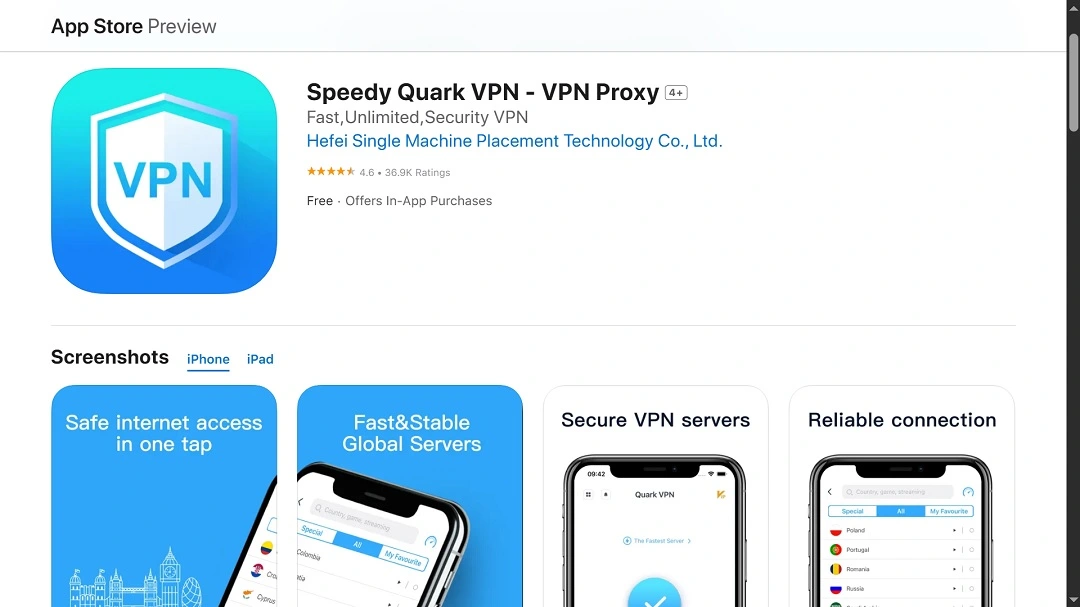
The Turbo VPN case: From Singapore to the Cayman Islands to Mainland China and Hong Kong
One of the most concerning revelations of the TTP report is the business history behind the Turbo VPN app. The owner is listed on Apple’s App Store as Innovative Connecting Pte. Ltd.
While the App Store page for this app has a note that warns that the app collects private data, TTP claims that Apple failed to properly verify who is really behind this app.
Who is Innovative Connecting?
Following the paper trail and documents, TTP found that Innovative Connecting Pte. Ltd is a company registered in Singapore. Moonlock verified this claim as true.
According to Crunch Base, Innovative Connecting is one of the fastest-growing Singapore Technology companies. Their specialization? Mobile App development. Crunch Base also reports that this company has seen a significant increase in revenue. Its growth score is set at 91 out of 100.
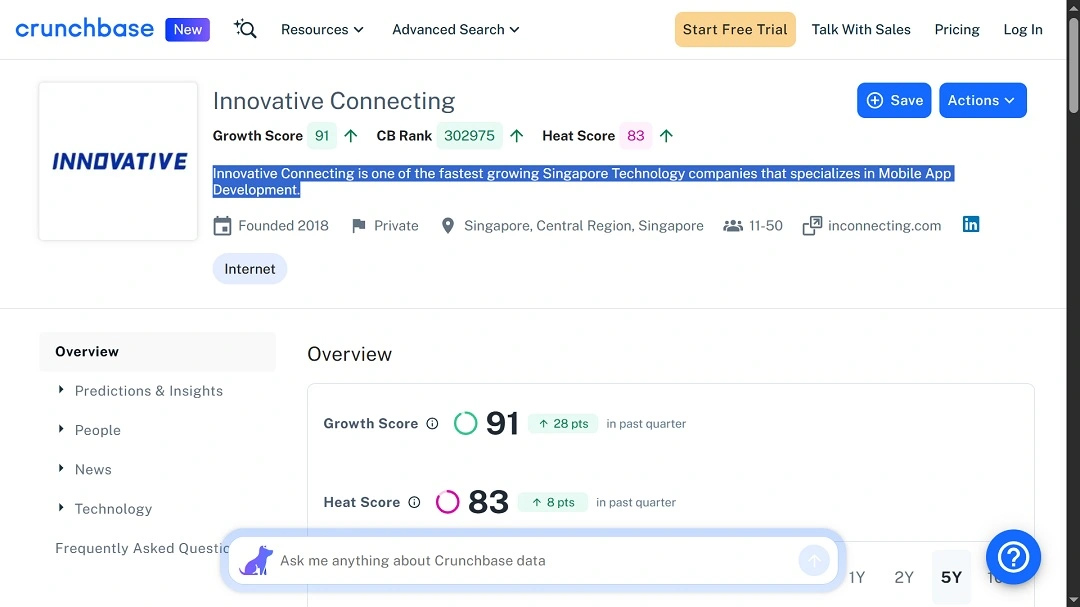
Moonlock checked the official site of Innovative Connecting and found that Chrome and other browsers flagged the site as “dangerous.”
After bypassing the browser warning (something you should not do), we found that it redirected us to the main page of Turbo VPN at www.turbovpn[.]com. We recommend that users not visit this site, as it may contain risky cookies and trackers.
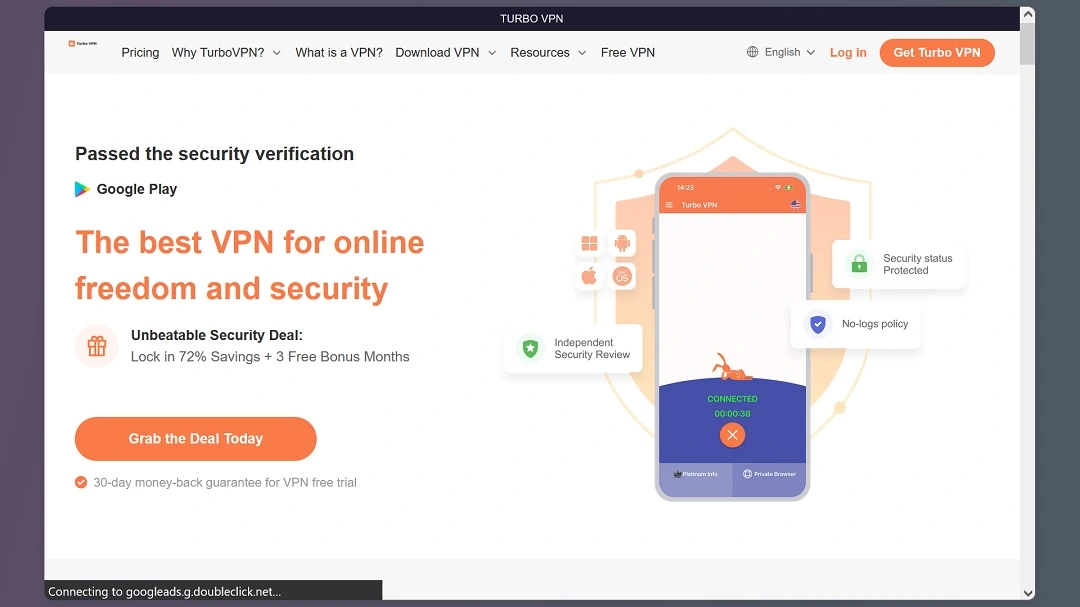
The importance of reading the fine print of VPNs and other apps
Moonlock checked the privacy policy of Turbo VPN and found that the company does warn users in the fine print that by downloading and installing the app, users agree to having their data processed in “any other country” that Connecting Innovation “engages in services” with.
The privacy policy (which, let’s be honest, no one reads) states:
“You hereby acknowledge the transfer of your data outside of the country where you reside.”
The privacy policy also warns that the company might be “compelled to disclose your data where we are served with a valid court order that is enforceable in Singapore, an order from law enforcement agencies, or where we are legally obligated to disclose your data.”
This type of language in privacy policies is common among Chinese companies, including DeepSeek.
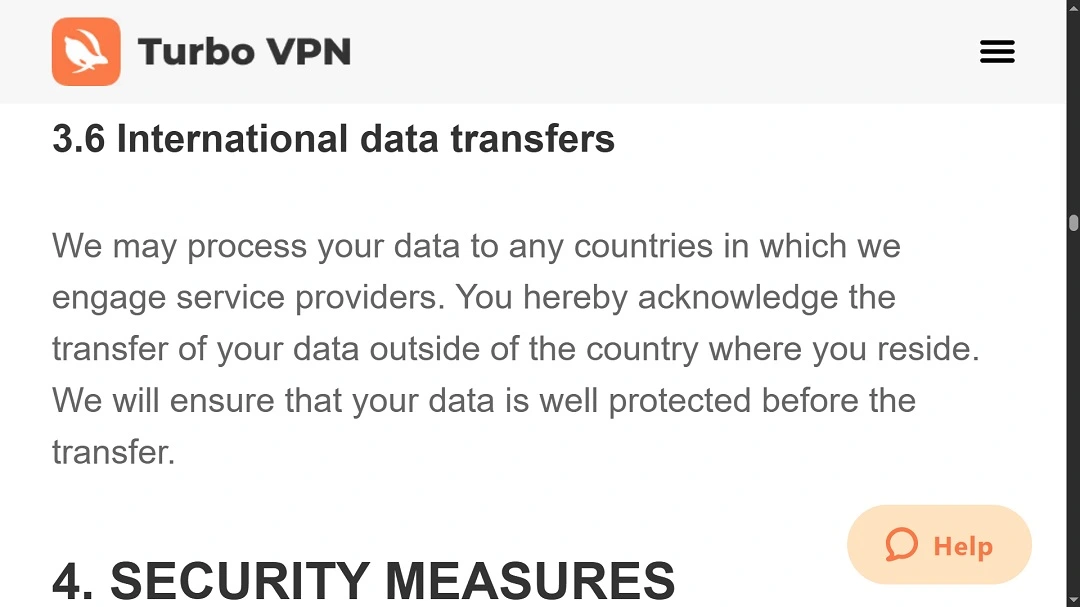
Tracking shell companies and shareholders leads to nowhere good
TTP’s investigation found that Innovative Connecting — registered in Singapore, as discussed — has, according to documents, just one shareholder. The shareholder is an entity called Lemon Seed Technology Ltd. This entity is registered in the Cayman Islands.
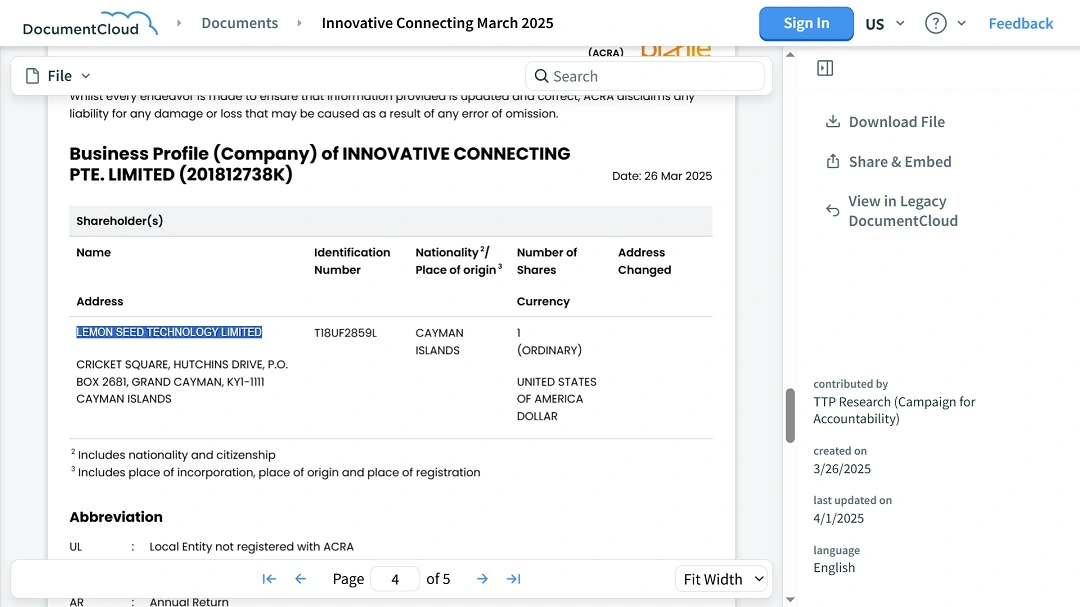
The same document lists an individual named Chen Ningyi acting as the director of the company since March of 2024. Chen Ningyi is listed as a Chinese national.
The infamous Qihoo 360 is allegedly behind several VPN apps on the App Store
TTP claims that Chen Ningyi is a central figure in their investigation and is linked to the controversial Chinese company Qihoo 360. Qihoo is a major Chinese cybersecurity company, also known as 360 Security Technology.
TTP provided documents and evidence that the Singapore company, tied to Lemon Seed Technologies in the Cayman Islands, was bought by Qihoo in 2019. The document presented is, according to TTP, Qihoo’s annual report for 2019.
Moonlock accessed this document but cannot verify nor deny its authenticity. We did find that TTP’s report is correct when it says that the document clearly states this acquisition.
On page 205 of the 214-page long document — written fully in Chinese characters — we found the alleged purchase of Lemon Seed Technology Limited and other related companies by Qihoo for $69,400,000 in cash and an “intangible asset.” What exactly an “intangible asset” is, or whether something has been lost in translation, is unknown to us at the time.
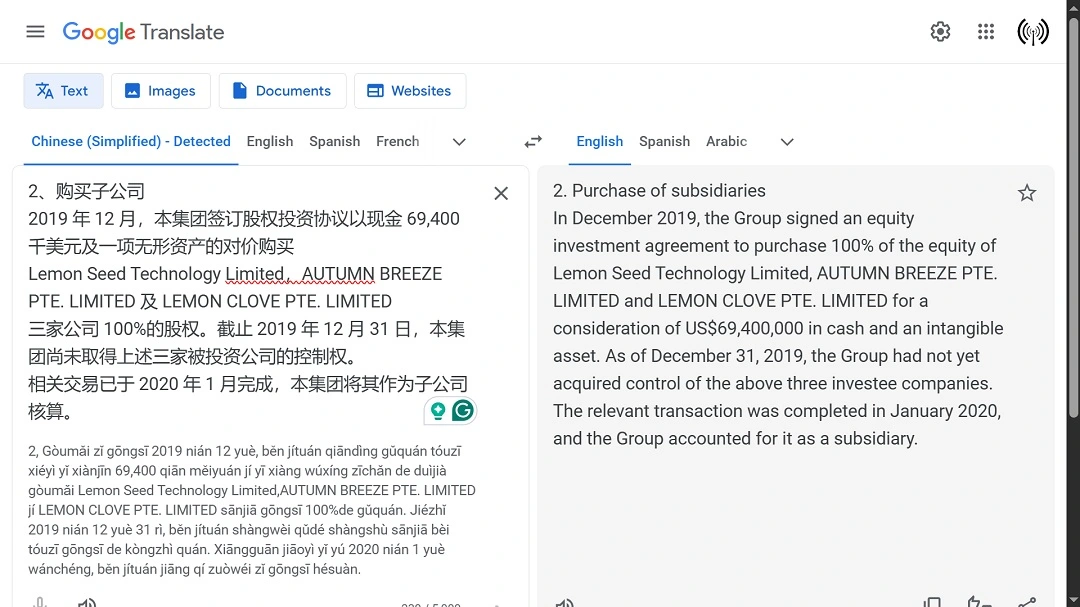
DoD and federal agencies say Qihoo is a “Chinese Military Company”
The Chinese company Quihoo has not only been involved in several concerning incidents but was blacklisted by the US Department of Defense (DoD) in 2021 as a “Chinese Military company.” This list was updated recently in January 2025. In both DoD documents, Qihoo is the first company listed.
The DoD warns that the fusion of the Chinese military with civilian companies is becoming a popular strategy. The DoD defines the companies that engage in this strategy as “Chinese Military Companies.”
TTP claims that Chen Ningyi’s data matches that of an individual who was described in 2020 by China Daily as a “general manager of 360 Mobile Guard, Qihoo 360’s mobile phone security app”. Moonlock cannot verify the claim at this time.
Besides being flagged by the US DoD and other federal agencies, Qihoo has been involved in several incidents. These range from installing backdoors on children’s watches and its cybersecurity solutions to a history of acquiring small tech companies.
“Innovative Connecting — the app company that came under the control of Qihoo — is behind multiple VPNs through a network of interlocking companies,” TTP said. The company is also behind the apps VPN Proxy Master, Thunder VPN, and Snap VPN.
TTP also found that 1 of the apps ran ads on Facebook and Instagram targeting teens from 13 years up. Another ad targeted Americans who were looking for a VPN to circumvent the TikTok ban in the US.
Similarly, TTP said that complex ownership of many apps appears to be deliberately opaque. Several companies conceal their structure behind “layers of offshore shell companies” — as in the case of Turbo VPN.
TTP claims that they determined the Chinese ownership of the 20 VPN apps being offered to Apple’s US users by piecing together corporate documents from around the world.
“None of those apps clearly disclosed their Chinese ownership,” TPP said.
As mentioned, due to the complexity and time-consuming process of verifying legal documents and other documents, Moonlock cannot confirm at this time that Qihoo is behind these VPN apps. However, the evidence presented by TTP and the history of the company makes it highly possible that this is the case.
What is Apple’s role and responsibility in all this?
If the evidence is true, Apple itself is not free from accountability or responsibility.
If 20 or more apps hosted and distributed via the App Store have been developed by ghost companies that work with the Chinese military, this is a serious problem for the company from Cupertino, California.
“For Apple, a company that markets itself as a champion of user privacy and security, this is a glaring security oversight,” TTP said.
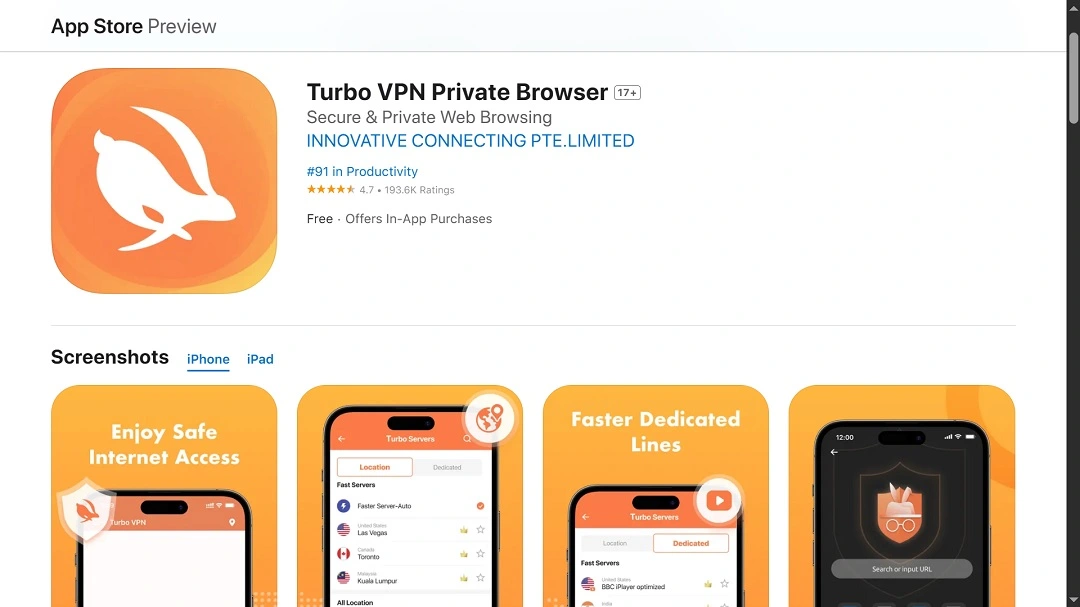
The findings raise serious questions about how Apple is verifying developers and how it is keeping its users safe from these obscure operations linked to nation-state cyberwarfare.
TTP claims that their investigation suggests that Apple “is not taking adequate steps to determine who owns the apps it offers its users and what they do with the data they collect.”
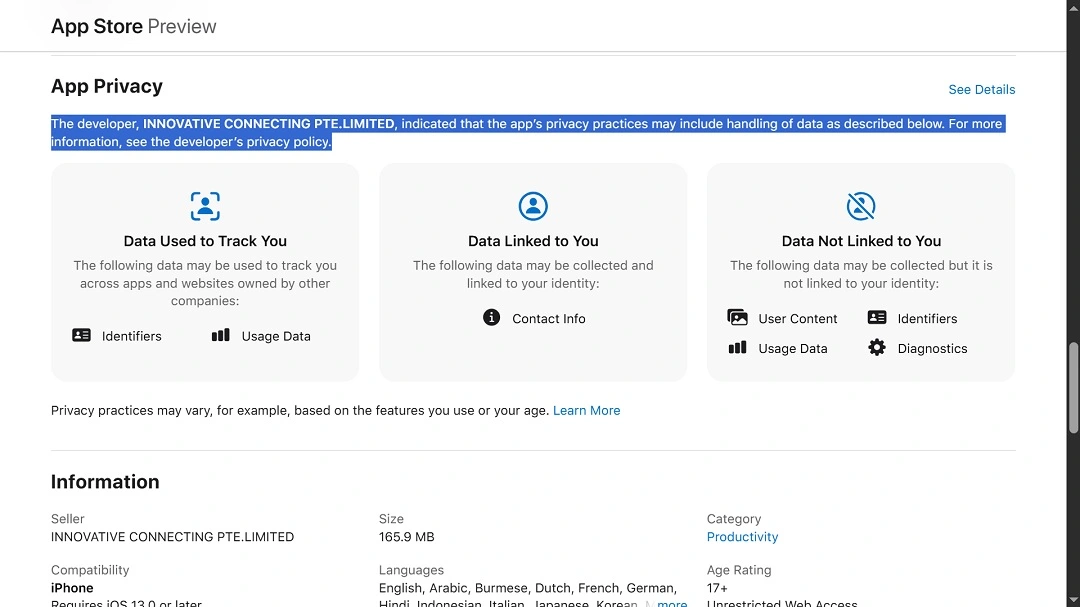
Moonlock found that VPN apps linked to TTP’s report are still being hosted on the Apple App Store. We recommend that users observe extreme caution when downloading a VPN as this news story develops.
Apple’s guidelines state that apps offering VPN services “may not sell, use, or disclose to third parties any data for any purpose.”
Overall, TTP determined that 20 of the top 100 free VPN apps in the App Store were owned by companies or individuals based in mainland China or Hong Kong and did not disclose their ties to China.
Final thoughts
Tracking an app’s developer should not be a wild journey that takes us from the Apple App Store to Singapore to the Cayman Islands and, later, to Hong Kong or mainland China. Obviously, something has gone wrong here.
The tactic of obfuscating online operations through shell companies is not new. What’s strange is that Apple’s security protocols seem to have failed to properly verify developers.
Given the current state of the global digital threat landscape and the escalating global tariff war led by the Trump administration, creating tensions specifically with China, we recommend that all users be very careful when downloading apps — from the App Store or anywhere else, for that matter.
This is an independent publication, and it has not been authorized, sponsored, or otherwise approved by Apple Inc. iOS and the App Store are trademarks of Apple Inc.






